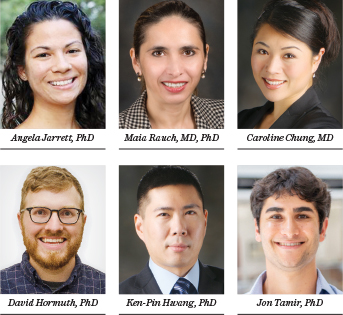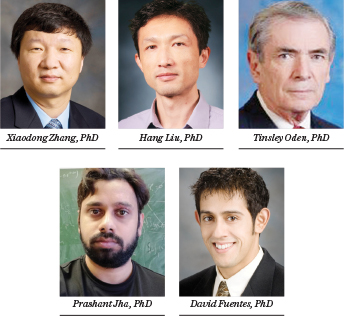The University of Texas (UT) MD Anderson Cancer Center, UT Austin Oden Institute for Computational Engineering and Sciences, and UT Austin Texas Advanced Computing Center (TACC) launched a new collaboration in oncologic data and computational science earlier this year. The strategic initiative creates a unique opportunity to align mathematical modeling and advanced computing methods with oncology expertise to bring forward new approaches that can improve outcomes for patients with unmet needs.


Here are the first five projects to be funded through the collaboration:
Angela Jarrett, PhD, of the Oden Institute, and Maia Rauch, MD, PhD, of MD Anderson, will develop a patient-specific mathematical model for forecasting treatment response and designing optimal therapy strategies for patients with triple-negative breast cancer.
Caroline Chung, MD, of MD Anderson, and David Hormuth, PhD, of the Oden Institute, will use computational models of the underlying biology to fundamentally change how radiotherapy and chemotherapy are personalized to improve survival rates for patients with brain cancer.
Ken-Pin Hwang, PhD, of MD Anderson, and Jon Tamir, PhD, of UT Austin’s Department of Electrical and Computer Engineering and the Oden Institute, will use mathematical modeling and massively parallel distributed computing to make prostate magnetic resonance imaging (MRI) faster and more accurate to reduce the incidence of unnecessary or inaccurate biopsies.
Xiaodong Zhang, PhD, of MD Anderson, and Hang Liu, PhD, of TACC, will advance both the planning and delivery of proton therapy via a platform that combines mathematical algorithms and high-performance computing to further personalize these already highly tailored treatments.
Tinsley Oden, PhD, and Prashant Jha, PhD, both of the Oden Institute, and David Fuentes, PhD, of MD Anderson, will integrate a new mechanistic model of tumor growth with an advanced type of MRI to reveal underlying metabolic alterations in tumors and lead to new treatments for patients.
“These extremely exciting projects sit at the interface of cancer, mechanism-based modeling, and computation, and promise to significantly advance our ability to fight this disease,” said Tom Yankeelov, PhD, Director of the Center for Computational Oncology at the Oden Institute. “The vision and quality of these investigators are extraordinary, and one would be hard pressed to assemble such talents anywhere else in the country.”
“These five research teams, made up of a cross-section of expertise from all three stakeholders, represent the beginning of something truly special,” said David Jaffray, PhD, Chief Technology and Digital Officer at MD Anderson. “Our experts are advancing cancer research and care, and we are committed to working with our colleagues at the Oden Institute and TACC to bring together their computational expertise with our data and insights.”

